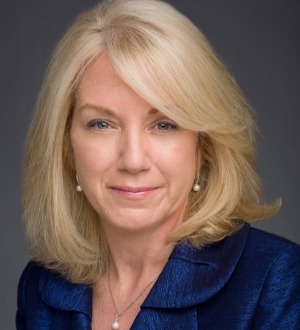This article was originally published in our 2021 "Women in the Law" Business Edition.
Much to my surprise, I’ve now been practicing law for 30 years with a private firm. I’ve developed relationships with so many people who have given me opportunities to build my legal skills, deepen my client relationships, hone my client service, assume a variety of firm and community leadership roles, and raise a family. This seems like a good time to share some thoughts about what I’ve learned, how I balance all my commitments, and the ways I help support other female attorneys.
Why practice law? During law school and my early years in private practice, I didn’t think I’d stay at a firm for more than two or three years. Like many, I viewed working at a large law firm as an opportunity to learn from others before opening my own practice, moving in[1]house, or maybe even starting my own business. I chose to go to law school, after all, because of the flexibility a law degree would give me to change career paths, entering and exiting the workforce as I raised my family.
That’s not what happened, though: I stayed. Why? Deep down, it’s because of the colleagues and clients I’ve worked with for so long, as well as the support I want to give those I work with now and those I hope to work with in the future.
Getting started: I’ve often shared with other women—particularly those in their first decade of practice—my view that one’s legal career isn’t a race, or even a marathon. It’s a journey, one that’s likely to change tack many times over 30 or 40 years. Throughout, many women will find themselves holding down a multitude of important family roles—daughter, niece, mother, stepmother, aunt, great-aunt, grandmother. As a female attorney, you’ll increasingly become someone on whom others rely, the way you’ve relied on so many people well into adulthood.
You might also participate in community groups, as well as local or national nonprofits. When you begin practicing law, focus on strengthening your legal skills, forging strong client and colleague relationships, and taking on some committee work in your profession and your community. If you start a family, you’ll constantly need to recalibrate the time you devote to each of these important roles.
Finding your fit: When I consider why I’ve stuck with private practice at a law firm, I’m reminded that I decided to change firms after just a year of practice. I had an 8-month-old daughter at the time, and when the October 1989 Bay Area earthquake hit, it separated me, by a broken bridge, from her and the rest of my family for many hours. I realized how much I wanted to move to a firm closer to home.
It was therefore an easy decision some months later when I found McCutchen, Doyle, Brown & Enersen, a 250-attorney firm that had promoted six women (and a handful of men) to equity partner in the spring of 1990. That might not sound like much today but promoting a half-dozen women to partner was almost unheard-of back then. McCutchen became my home away from home for the next 21 years. Working closer to my family, I raised my daughters alongside many women partners, associates, and non-attorney staff, confident that I was in a place I could practice law successfully (both full-time and part-time), care for my family, and give back through pro bono and committee work.
Although there were exceptions, the attorneys I worked with, men and women alike, were strongly committed to supporting and mentoring female attorneys and legal staff. Indeed, many of us still work together at Perkins Coie, where we moved together as a group so we could keep practicing together in 2011.
Hitting your stride: As you enter your second professional decade, find a practice you love and seek roles that enable you to lead on issues that are important to you. With luck, you’ll have gained a variety of skill sets across numerous areas of the law. Focus on the ones you enjoy, the ones that make you want to get out of bed in the morning.
Working closer to my family, I raised my daughters alongside many women partners, associates, and non-attorney staff, confident that I was in a place I could practice law successfully, care for my family, and give back through pro bono and committee work."
For me, one such area was land-use and development law, which I didn’t encounter until several years after I became a partner. Now—even though I otherwise lack artistic talent—when a new project comes in, I find the first client call or meeting to be akin to a painter’s blank canvas, on which I can start to fill in a vision by learning the client’s goals and challenges, creating strategies and solutions. With time, I’ll often be able to complete the picture with the construction of a new project—a residential community, affordable housing, educational facilities, or a redeveloped life-science campus. If you can experience a similar sense of challenge and accomplishment in your work, you will thrive as a lawyer.
Mentoring and empowering others: This is also the time to focus on hiring, training, and promoting women attorneys, particularly those of color. It’s a time to delegate work and empower others to learn by doing, not just watching. In my own early associate years, my mentors sent me to court on my own, included me in client meetings, and invited me to speak alongside them at conferences— opportunities that gave me the tools to become a versatile attorney and the commitment to do the same for others in turn.
If you’re new to practicing law, seek out these opportunities. If you’ve been at it for a while, provide similar chances to others. This is your time to offer guidance, training, mentoring, and sponsorship while continuing to build your own skills and those of your teams. Their strengths will become your strengths. Remember, though, your career isn’t a race—this might also be a time to step back a bit from work and community commitments to spend more time caring for your family, including your extended family.
Giving back: Once you’ve been a partner or senior in-house counsel for a decade or two, you’re in a great position to provide work opportunities and guidance to others. You might find that the junior in-house attorney you knew as an associate is now general counsel of an international company; that you’ve developed the skills to join a firmwide management or executive committee; or that you know female attorneys across the country (or just across town) whom you can connect with people who need their legal expertise.
As you find your voice—and as others listen—you might also foster and pursue firmwide or community initiatives on social issues that are important to you, as I have in my recent roles on our firmwide executive committee and as chair of a national practice group. Through your experience, long-term commitments, and nurtured relationships, you’ll be positioned to continue to bolster your own client work and also provide a positive, lasting influence on your workplace culture.
None of this is easy. Almost every day I rethink what I’m doing, asking myself (and perhaps my husband, my mom, or one of my daughters), “Am I doing the right thing? Do I need to change the amount of energy I’m devoting to my career, my client work, my leadership roles, my community, and my family?” By continuously searching for that balance, you’ll be able to find and maintain the energy necessary for you and those you mentor to succeed, over time, in every aspect of the law—and of life.
Cecily Barclay is the firmwide Chair of the Real Estate and Land Use Practice at Perkins Coie LLP in San Francisco where she focuses her practice on land use and entitlements, real estate acquisition and development and local government law. She regularly speaks and writes on topics involving land use and local government law, including programs and articles for the American Bar Association, American Planning Association, California Continuing Education of the Bar, League of California Cities, University of California Extension programs, Urban Land Institute and other state and national associations and conferences.

































